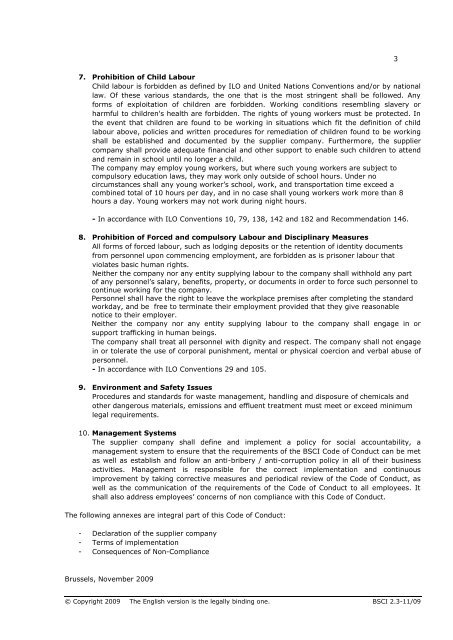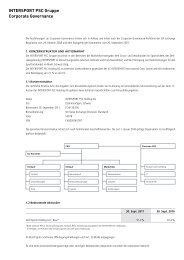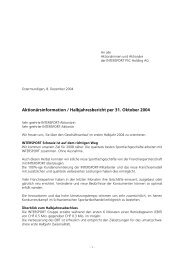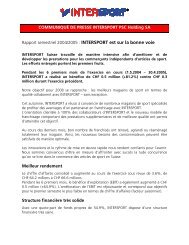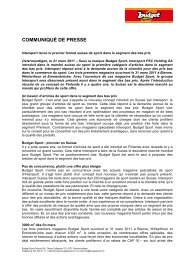BSCI Code of Conduct - Intersport
BSCI Code of Conduct - Intersport
BSCI Code of Conduct - Intersport
Create successful ePaper yourself
Turn your PDF publications into a flip-book with our unique Google optimized e-Paper software.
7. Prohibition <strong>of</strong> Child Labour<br />
Child labour is forbidden as defined by ILO and United Nations Conventions and/or by national<br />
law. Of these various standards, the one that is the most stringent shall be followed. Any<br />
forms <strong>of</strong> exploitation <strong>of</strong> children are forbidden. Working conditions resembling slavery or<br />
harmful to children's health are forbidden. The rights <strong>of</strong> young workers must be protected. In<br />
the event that children are found to be working in situations which fit the definition <strong>of</strong> child<br />
labour above, policies and written procedures for remediation <strong>of</strong> children found to be working<br />
shall be established and documented by the supplier company. Furthermore, the supplier<br />
company shall provide adequate financial and other support to enable such children to attend<br />
and remain in school until no longer a child.<br />
The company may employ young workers, but where such young workers are subject to<br />
compulsory education laws, they may work only outside <strong>of</strong> school hours. Under no<br />
circumstances shall any young worker’s school, work, and transportation time exceed a<br />
combined total <strong>of</strong> 10 hours per day, and in no case shall young workers work more than 8<br />
hours a day. Young workers may not work during night hours.<br />
- In accordance with ILO Conventions 10, 79, 138, 142 and 182 and Recommendation 146.<br />
8. Prohibition <strong>of</strong> Forced and compulsory Labour and Disciplinary Measures<br />
All forms <strong>of</strong> forced labour, such as lodging deposits or the retention <strong>of</strong> identity documents<br />
from personnel upon commencing employment, are forbidden as is prisoner labour that<br />
violates basic human rights.<br />
Neither the company nor any entity supplying labour to the company shall withhold any part<br />
<strong>of</strong> any personnel’s salary, benefits, property, or documents in order to force such personnel to<br />
continue working for the company.<br />
Personnel shall have the right to leave the workplace premises after completing the standard<br />
workday, and be free to terminate their employment provided that they give reasonable<br />
notice to their employer.<br />
Neither the company nor any entity supplying labour to the company shall engage in or<br />
support trafficking in human beings.<br />
The company shall treat all personnel with dignity and respect. The company shall not engage<br />
in or tolerate the use <strong>of</strong> corporal punishment, mental or physical coercion and verbal abuse <strong>of</strong><br />
personnel.<br />
- In accordance with ILO Conventions 29 and 105.<br />
9. Environment and Safety Issues<br />
Procedures and standards for waste management, handling and disposure <strong>of</strong> chemicals and<br />
other dangerous materials, emissions and effluent treatment must meet or exceed minimum<br />
legal requirements.<br />
10. Management Systems<br />
The supplier company shall define and implement a policy for social accountability, a<br />
management system to ensure that the requirements <strong>of</strong> the <strong>BSCI</strong> <strong>Code</strong> <strong>of</strong> <strong>Conduct</strong> can be met<br />
as well as establish and follow an anti-bribery / anti-corruption policy in all <strong>of</strong> their business<br />
activities. Management is responsible for the correct implementation and continuous<br />
improvement by taking corrective measures and periodical review <strong>of</strong> the <strong>Code</strong> <strong>of</strong> <strong>Conduct</strong>, as<br />
well as the communication <strong>of</strong> the requirements <strong>of</strong> the <strong>Code</strong> <strong>of</strong> <strong>Conduct</strong> to all employees. It<br />
shall also address employees’ concerns <strong>of</strong> non compliance with this <strong>Code</strong> <strong>of</strong> <strong>Conduct</strong>.<br />
The following annexes are integral part <strong>of</strong> this <strong>Code</strong> <strong>of</strong> <strong>Conduct</strong>:<br />
- Declaration <strong>of</strong> the supplier company<br />
- Terms <strong>of</strong> implementation<br />
- Consequences <strong>of</strong> Non-Compliance<br />
Brussels, November 2009<br />
© Copyright 2009 The English version is the legally binding one. <strong>BSCI</strong> 2.3-11/09<br />
3


